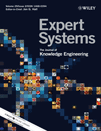
EXPERT SYSTEMS
Scope & Guideline
Exploring the Frontiers of Expert Systems and AI Applications.
Introduction
Aims and Scopes
- Artificial Intelligence and Machine Learning Applications:
The journal publishes research that applies AI and machine learning techniques to diverse fields, including healthcare, finance, and environmental studies, showcasing how these technologies can enhance decision-making and predictive accuracy. - Expert Systems Development:
Research on the design, implementation, and evaluation of expert systems is a core focus, emphasizing rule-based systems, fuzzy logic, and decision support systems that aid in complex problem-solving. - Data Science and Analytics:
Papers often explore data-driven methodologies, including big data analytics, predictive modeling, and statistical analysis, to extract meaningful insights from large datasets. - Optimization Techniques:
The journal covers various optimization strategies, including metaheuristic and evolutionary algorithms, that enhance the performance of AI systems and improve computational efficiency. - Interdisciplinary Applications:
Research often spans multiple disciplines, demonstrating the versatility of expert systems and AI in areas such as agriculture, healthcare, cybersecurity, and smart cities.
Trending and Emerging
- Generative Models and Adversarial Learning:
There is a growing interest in generative adversarial networks (GANs) and similar models, which are being applied to various domains including image generation, anomaly detection, and data augmentation. - Federated Learning:
Federated learning is emerging as a significant trend, enabling decentralized model training while preserving data privacy, particularly relevant in healthcare and IoT applications. - Explainable AI (XAI):
Research focused on the interpretability and transparency of AI models is trending, as stakeholders demand clearer insights into decision-making processes of complex algorithms. - Integration of AI with IoT:
Papers increasingly explore the integration of AI with Internet of Things (IoT) technologies, highlighting applications in smart cities, healthcare monitoring, and automated systems. - Multimodal Learning:
There is a rising trend in research that combines data from multiple sources (e.g., text, images, and signals) to enhance the performance of machine learning models, reflecting the complexity of real-world applications.
Declining or Waning
- Traditional Rule-Based Systems:
There has been a noticeable decline in papers focused solely on traditional rule-based expert systems, possibly due to the growing interest in more adaptive and learning-based approaches such as neural networks. - Basic Statistical Methods:
Research employing basic statistical techniques without the integration of advanced machine learning frameworks appears to be waning, as the field moves toward more sophisticated and automated data analysis methods. - Narrow Domain Applications:
Studies that apply expert systems to highly specialized or narrow domains are becoming less common, as researchers seek broader applications that can demonstrate the versatility of AI technologies. - Manual Feature Engineering:
As deep learning techniques gain traction, the reliance on manual feature engineering in machine learning models is declining, with more emphasis on automated feature extraction methods.
Similar Journals
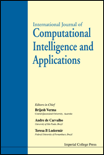
International Journal of Computational Intelligence and Applications
Empowering Scholars in the Realm of Computational IntelligenceThe International Journal of Computational Intelligence and Applications, published by WORLD SCIENTIFIC PUBL CO PTE LTD, is a prominent journal dedicated to advancing the field of computational intelligence and its applications, with a keen focus on innovative methodologies and theoretical frameworks. With an impact factor reflective of its growing influence, the journal is classified in Q3 for Computer Science Applications and holds Q4 standings in both Software and Theoretical Computer Science as of 2023, showcasing its critical niche within these disciplines. Established in 2008 and converging through 2024, this journal serves as a vital resource for researchers, professionals, and students in Singapore and beyond, promoting scholarly communication and collaboration. Although it is a non-open access journal, it still provides a wealth of information that is readily accessible through institutional subscriptions and library resources. Researchers contributing to the journal benefit from its wide reach and dedicated readership, making it a substantial platform to disseminate groundbreaking research and insights.

International Journal of Automation and Computing
Connecting Global Minds in Automation and ComputingInternational Journal of Automation and Computing, published by SPRINGERNATURE, is a premier academic journal dedicated to advancing knowledge in the fields of applied mathematics, computer science applications, control and systems engineering, and modeling and simulation. With an impressive impact factor and consistently ranked in the Q1 Quartile for its respective categories in 2023, the journal is recognized for its high-quality research and contributions to the automation and computing sectors. This journal provides open access to its articles, promoting the dissemination of innovative ideas and methodologies across a global audience. Based in China but serving an international community, the journal is key for researchers, professionals, and students looking to stay at the forefront of automation and computing technologies. Its rigorous peer-review process ensures that published works meet the highest scientific standards, making it an essential resource for those seeking to deepen their understanding and engage in cutting-edge research.
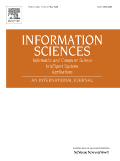
INFORMATION SCIENCES
Navigating the Future of Information ScienceINFORMATION SCIENCES, published by Elsevier Science Inc, is a premier peer-reviewed journal that has become instrumental in advancing the field of information science since its inception in 1968. With an impressive array of quartile rankings in 2023, including Q1 in Artificial Intelligence, Computer Science Applications, Control and Systems Engineering, Information Systems and Management, Software, and Theoretical Computer Science, this journal serves as a vital resource for researchers and professionals looking to explore cutting-edge theories and practical applications within these domains. The journal is indexed extensively, with notable Scopus rankings, reflecting its significance and influence in the academic community—ranked 6th in Theoretical Computer Science and 10th in Information Systems and Management, among others. Although it does not currently offer an open-access option, the depth of research published within INFORMATION SCIENCES ensures that it remains a key reference point for advancing academic inquiry and addressing complex challenges in the information landscape.

International Journal of Innovative Computing Information and Control
Exploring cutting-edge theories in information systems.International Journal of Innovative Computing Information and Control, published by ICIC INT, is a prominent platform dedicated to advancing the fields of computational theory, information systems, software engineering, and theoretical computer science. Since its inception in 2007, the journal has garnered attention for its rigorous peer-reviewed research and has established itself within the academic community, attaining a notable Q3 quartile ranking across its categories as of 2023. With an impressive track record of convergence from 2007 to 2024, this journal offers a wealth of insights and innovations for researchers and professionals striving to push the boundaries of technology and computing. While it operates under a subscription model, the journal's commitment to enhancing knowledge in the ever-evolving landscape of computational sciences makes it an essential resource for academics, providing timely articles that address contemporary challenges in the field.

International Journal of Fuzzy Systems
Transforming Complexity into Clarity through Fuzzy LogicThe International Journal of Fuzzy Systems, published by SPRINGER HEIDELBERG, is a premier platform for disseminating cutting-edge research in the fields of Artificial Intelligence, Control and Systems Engineering, Computational Theory and Mathematics, and more. With an impressive impact factor reflected in its Q2 category rankings across various domains, this journal serves as a vital resource for researchers, professionals, and students eager to explore the applications of fuzzy logic in solving complex real-world problems. Established in 2004, the journal continues to contribute significantly to theoretical advancements and practical implementations in areas such as information systems and software engineering. The journal does not offer Open Access, ensuring a curated audience of engaged readers and contributors. Its rigorous peer-review process guarantees high-quality publications that resonate within the scientific community. For those interested in the intersection of theoretical insights and practical applications, the International Journal of Fuzzy Systems stands out as an essential venue for knowledge exchange and innovation.
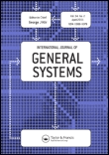
INTERNATIONAL JOURNAL OF GENERAL SYSTEMS
Advancing Systems Theory for a Complex WorldThe INTERNATIONAL JOURNAL OF GENERAL SYSTEMS, published by TAYLOR & FRANCIS LTD, is a prestigious peer-reviewed journal dedicated to advancing the fields of systems theory and its applications across a variety of scientific disciplines. With an ISSN of 0308-1079 and an E-ISSN of 1563-5104, this journal has carved a niche since its inception in 1974, continuing to provide a platform for innovative research through to 2024. Featured in the esteemed Q2 category in multiple domains, including Computer Science Applications, Control and Systems Engineering, and Information Systems, it serves as a vital resource for the scientific community, fostering interdisciplinary collaboration. The journal's rankings in Scopus reflect its quality, with noteworthy positions in fields such as Mathematics, Engineering, and Theoretical Computer Science. While access is through subscription, the journal remains an essential conduit for researchers, professionals, and students eager to deepen their understanding of general systems and their complex interactions within various environments.

Fuzzy Optimization and Decision Making
Leading the Charge in Fuzzy Optimization ResearchFuzzy Optimization and Decision Making, published by Springer, is a prestigious academic journal that has made significant contributions to the fields of Artificial Intelligence, Logic, and Software. With an impressive impact factor and a consistent ranking in the top Q1 quartile across its categories, this journal stands at the forefront of research dissemination in its domain. Established in 2002 and continuing through 2024, the journal focuses on the theoretical and practical aspects of fuzzy optimization methods and their applications in decision-making scenarios. The journal is highly regarded for its rigorous peer-review process and aims to present innovative research findings that inspire advancements in optimization techniques using fuzzy logic. Aimed at researchers, professionals, and students alike, Fuzzy Optimization and Decision Making serves as an essential resource for those looking to stay at the cutting edge of technology and methodology in mathematics and computer science.
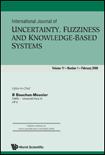
INTERNATIONAL JOURNAL OF UNCERTAINTY FUZZINESS AND KNOWLEDGE-BASED SYSTEMS
Bridging the gap between theory and application in fuzzy logic.Welcome to the INTERNATIONAL JOURNAL OF UNCERTAINTY FUZZINESS AND KNOWLEDGE-BASED SYSTEMS, a prestigious publication dedicated to advancing the fields of artificial intelligence, control systems engineering, information systems, and software research. Published by WORLD SCIENTIFIC PUBL CO PTE LTD in Singapore, this journal serves as a vital forum for the dissemination of innovative theories, methodologies, and applications rooted in the coexistence of uncertainty and fuzziness within knowledge-based systems. With its ISSN 0218-4885 and E-ISSN 1793-6411, the journal consistently ranks in the Q3 category across various Scopus categories, including Control and Systems Engineering and Information Systems, reflecting its influential position in the academic community. Researchers and practitioners alike will find valuable insights and the latest trends through its comprehensive articles, making this journal an essential resource for those seeking to navigate the complexities of this evolving field.
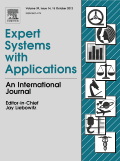
EXPERT SYSTEMS WITH APPLICATIONS
Fostering Interdisciplinary Insights for TomorrowEXPERT SYSTEMS WITH APPLICATIONS is a premier journal published by PERGAMON-ELSEVIER SCIENCE LTD, dedicated to showcasing cutting-edge research in the fields of Artificial Intelligence, Computer Science Applications, and Engineering. With an esteemed Q1 ranking across multiple categories, this journal not only reflects high-quality scholarship but also plays a pivotal role in advancing the application of expert systems and intelligent technologies in various sectors. Operating from the United Kingdom, it features a wide range of insightful articles that address complex challenges and offer innovative solutions through interdisciplinary approaches. Researchers and practitioners can access invaluable resources to inform their work, contributing to the journal's strong reputation and growing readership. With its convergence of relevant technologies from 1990 to 2025, EXPERT SYSTEMS WITH APPLICATIONS stands as an essential source for those aiming to push the boundaries of knowledge in these thriving fields, making it a key platform for both established experts and emerging scholars.
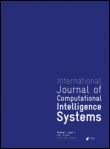
International Journal of Computational Intelligence Systems
Pioneering Innovations in Intelligent SystemsInternational Journal of Computational Intelligence Systems, published by SPRINGERNATURE, is a leading open-access journal that has been at the forefront of research in the field of computational intelligence since 2008. With an ISSN of 1875-6891 and an E-ISSN of 1875-6883, this journal occupies a prominent place in the academic landscape, achieving impressive rankings in its categories: Q2 in both Computational Mathematics and Computer Science (miscellaneous), reflecting its significance and relevance to researchers, professionals, and students. Based in Switzerland, the journal is committed to disseminating high-quality research and fostering innovation in computational methodologies, algorithms, and applications. Its strong impact factor and Scopus rankings—31/189 in Computational Mathematics and 53/232 in General Computer Science—underscore its critical role in advancing knowledge in these interdisciplinary fields. As an open-access journal, it provides unparalleled accessibility to cutting-edge research, supporting the global community in staying at the forefront of computational intelligence advancements.